#lotr characters as
Text
LOTR Characters as surgical hospital staff
I've had a million surgeries growing up (give or take) and was in the hospital again recently, and I coped by casting my comfort characters as hospital staff, as one does.
Please allow me to present my over-idealized hospital scenario in the form of... LOTR characters as hospital workers:
Frodo: Works the surgery admissions desk. Even at 5:45 in the morning he is cheerful and attentive. He always jumps up to help people with wheelchairs/canes or to point out the most comfortable seat in the waiting room. He asks questions gently and translates medical/insurance jargon so that different types of patients can understand them best. After he secures your hospital bracelet (verifying name and date of birth, of course) he walks with you down the hall to your next stop to get ready for pre-op. He enjoys being the first point of contact for patients because he can try to set the tone to ease anxieties. He doesn’t say he hopes everything goes well with your surgery… he assures you it will!
Merry: Pre-op nurse. Going in and out between rooms sometimes gets hectic but he’s pretty laid back and somehow has the timing of changing into hospital gowns down to a science so no one is ever waiting too long or interrupted disrobed. Gets your IV in with no problem and is more than generous with heated blankets, to the point you could probably make a blanket fort. Always talks about the randomest things to keep your mind off the surgery you’ll soon be having. Has nothing but praise for the anesthesiologist.
Éowyn: The anesthesiologist. She’s covered in medical PPE, but communicates clearly just from her eyes and voice. She sits next to your bed while she goes over everything and gives you honest answers even if they’re scary. When you ask for a little pre-anesthesia sedation she mixes up the perfect dose that doesn’t hit you too hard. It actually makes you feel relaxed, not just sedated.
Arwen: The OR nurse that accompanies you from pre-op into the surgical room. She hooks up your oxygen and talks to you while everyone else rushes around. She has a talent for reassuring eye contact. Everything is bright and overwhelming but her gentle, low voice gives you something to focus on. She asks gentle questions, explains what is going on, and holds your hand if you need. She’s the one telling you to count backward from ten as you get a little dizzy, and it’s her soothing words that give you permission to drift off to sleep.
Faramir: Post-op nurse, monitoring you when you’re waking up from the anesthesia. He knows all the right things to say to all your weird questions and nonsensical statements as you come out of it. Gently keeps you from disrupting your oxygen tube. Interprets enough of your loopy sentences to discern that you actually need nausea medicine and stays on top of it.
Aragorn: Inexplicably the only phlebotomist the hospital apparently has. He’s the one that takes your blood in pre-op and you think you’ll never see him again, but when they decide they need an emergency lab done late one night during your hospital stay, he’s the one that shows up, knocking incredibly soft on your door before he enters. Somehow he remembers everything you had talked about when he first saw you in pre-op, and picks up the conversation pretty much where you left off. He has a talent for talking about the things that make you just happy enough to distract you from getting blood drawn. Of everyone, he looks the most out of place in scrubs but that somehow makes you trust him more.
Pippin: The night shift nurse technician with the worst ever luck. If he’s on shift it’s pretty much guaranteed the blood pressure cuff will never work properly and the IV pump will explode, or at the very least make all manner of beeping noises at the worst times. He’s visibly relieved when you tell him you couldn’t sleep anyway, so you don’t mind, after five solid minutes of trying to shut the machine up. After things settle down he’s genuinely concerned over how difficult it is for you to sleep and checks in on you more often through the night. After his shift, you recall some lighthearted chats you’ve had with him through the night and it’s enough to help you finally get some rest in the early morning.
Galadriel: Radiologist that shows up to whisk you away to a different part of the hospital with cool art on the walls and stained glass panels on the ceiling. Everything is kind of floaty and you’re still unsteady but she’s way stronger than she looks and gets you on the table for your imaging with ease. It’s quite comfortable and the only thing you’ve done in this place since you checked in with Frodo that hasn’t hurt. This makes you kind of emotional, plus you’re still out of it from pain meds and not sleeping so you blurt out that she’s the most beautiful person you’ve ever seen in your life. (She probably hears that all the time.)
Haldir: Day shift nurse that keeps everything on the floor running the way it needs to. He keeps you informed exactly of what to expect with everything you have going on: meds, IV changes, checks on your incision and drains. He always makes sure you’re ready for physical therapy on time, though he absolutely hates it when PT plays games in the hallway. (He tries not to let his feelings about this show to patients, because he knows they love playing games in the hallway, but he certainly will not hesitate to confiscate various sporting accoutrements if they become disruptive.)
Legolas & Gimli: The two physical therapists that work your floor, and they take turns. Of course their trading off turns into a competition. You walked half the length of the hall with Gimli, but the next day you walked the entire length of the hall with Legolas. Gimli gets ahead when you tackle not one but TWO stairs. It becomes obvious you are making better progress on Gimli days, so Legolas tries to win by bringing a volleyball for you to kick around the hallway. When things get out of hand and Haldir intervenes, Legolas says it was Gimli’s idea. (He then hides the volleyball from Haldir in your room.)
Gandalf: The random hospital chaplain that never shows up at the same time twice, even though he always says he’ll stop by “right before lunch.” Sometimes it’s 8 AM sometimes it’s 2 in the afternoon, once it was almost midnight, but you were awake and it was nice to have company for a few minutes. (The only problem is if he shows up during PT. Legolas will cut your session short so you can visit, Gimli will make him wait.) You think Gandalf should maybe be talking about religious stuff since that’s his job but he talks about anything you bring up or are interested in. Has been known to hang out and watch entire movies on the Classic Films channel with patients and sneak in vending machine snacks.
Boromir: Fills in one night as night shift nurse (he’s usually in the ICU). He doesn’t talk much at first, but he’s incredibly observant. As soon as he enters the room, before you can say anything about it feeling uncomfortable, he notices something is wrong with your incision drain and immediately fixes it. You’re kind of worried when you see Pippin is the nurse tech that night, but they actually work well together and Boromir doesn’t seem to mind even the fifth heart monitor malfunction of the night. By the end of the shift he’s cracked a few jokes and takes your vitals before he leaves so Pippin can avoid another altercation with the blood pressure machine.
Sam: The nutritionist that is responsible for the plate of waffle cut fries showing up to your room at 3 am the night after you’re cleared off the liquid diet. Because you need the calories and can’t sleep anyway. And when you were on the liquid diet, he wrote in a request on your behalf to only have cherry Jello sent after you mention that you don’t care much for orange or lime. He makes helpful suggestions but never pushes anything. (However, he does show up to chat with you in person after you didn’t order anything from the kitchen except cheese sticks and ice cream sandwiches for three meals in a row.)
Elrond: The surgeon with an odd, distant, but ultimately endearing bedside manner. He always severely over-estimates the recovery time for his patients. It’s only after reading the third night report that you were eating french fries and kicking a volleyball around the hall with Gandalf at three in the morning that he reluctantly discharges you.
Note: I was in a pediatric ward as a kid for like two months once, and on certain days they would indeed let us play volleyball in the hallway. I doubt anywhere allows adults to do this, but for this little fantasy, I couldn't resist. Thanks for reading!
#lotr#lotr headcanons#lotr imagine#lotr imagines#lotr characters as#lotr characters as hospital staff#lord of the rings#lotr characters#lotr hospital au#the fellowship as#the fellowship of the ring#lotr x reader
24 notes
·
View notes
Photo





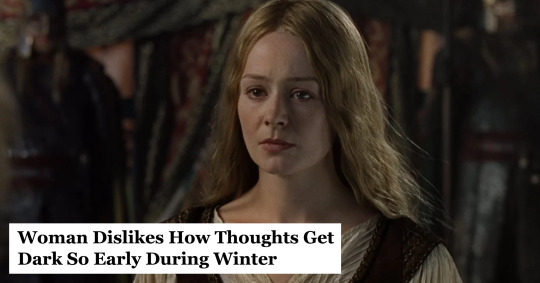

LotR + Hobbit Characters as Onion Headlines - Pt. 3/?
#lord of the rings#the hobbit#lotr characters#lord of the rings characters#hobbit characters#characters as#characters as onion headlines#lotr characters as#hobbit characters as#the onion
269 notes
·
View notes
Text
so we all agree that lord of the rings is a musical
#lotr#lord of the rings#songs sung by characters in-universe about the events and plot and characters#mine.txt#gigolas#samfro#1k#best of#10k
21K notes
·
View notes
Text
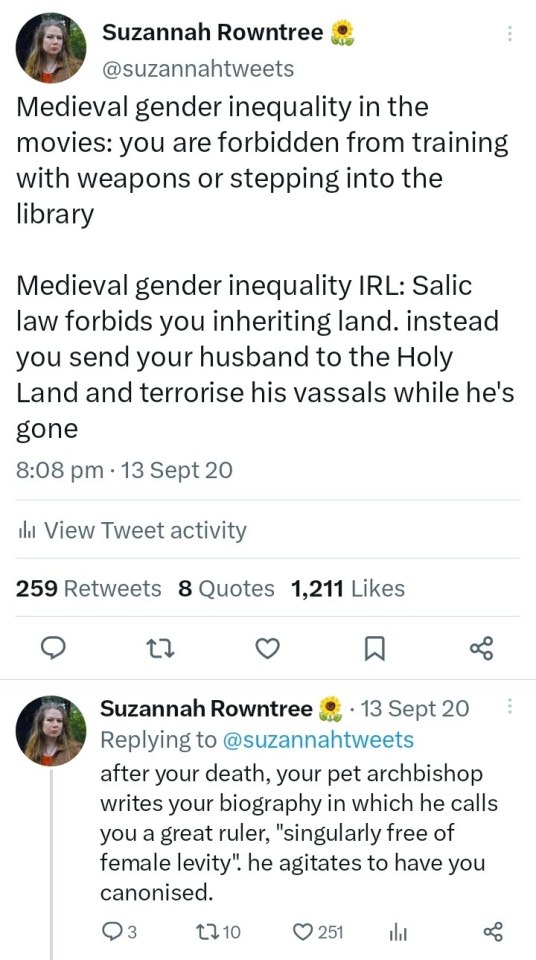
all RIGHT:
Why You're Writing Medieval (and Medieval-Coded) Women Wrong: A RANT
(Or, For the Love of God, People, Stop Pretending Victorian Style Gender Roles Applied to All of History)
This is a problem I see alllll over the place - I'll be reading a medieval-coded book and the women will be told they aren't allowed to fight or learn or work, that they are only supposed to get married, keep house and have babies, &c &c.
If I point this out ppl will be like "yes but there was misogyny back then! women were treated terribly!" and OK. Stop right there.
By & large, what we as a culture think of as misogyny & patriarchy is the expression prevalent in Victorian times - not medieval. (And NO, this is not me blaming Victorians for their theme park version of "medieval history". This is me blaming 21st century people for being ignorant & refusing to do their homework).
Yes, there was misogyny in medieval times, but 1) in many ways it was actually markedly less severe than Victorian misogyny, tyvm - and 2) it was of a quite different type. (Disclaimer: I am speaking specifically of Frankish, Western European medieval women rather than those in other parts of the world. This applies to a lesser extent in Byzantium and I am still learning about women in the medieval Islamic world.)
So, here are the 2 vital things to remember about women when writing medieval or medieval-coded societies
FIRST. Where in Victorian times the primary axes of prejudice were gender and race - so that a male labourer had more rights than a female of the higher classes, and a middle class white man would be treated with more respect than an African or Indian dignitary - In medieval times, the primary axis of prejudice was, overwhelmingly, class. Thus, Frankish crusader knights arguably felt more solidarity with their Muslim opponents of knightly status, than they did their own peasants. Faith and age were also medieval axes of prejudice - children and young people were exploited ruthlessly, sent into war or marriage at 15 (boys) or 12 (girls). Gender was less important.
What this meant was that a medieval woman could expect - indeed demand - to be treated more or less the same way the men of her class were. Where no ancient legal obstacle existed, such as Salic law, a king's daughter could and did expect to rule, even after marriage.
Women of the knightly class could & did arm & fight - something that required a MASSIVE outlay of money, which was obviously at their discretion & disposal. See: Sichelgaita, Isabel de Conches, the unnamed women fighting in armour as knights during the Third Crusade, as recorded by Muslim chroniclers.
Tolkien's Eowyn is a great example of this medieval attitude to class trumping race: complaining that she's being told not to fight, she stresses her class: "I am of the house of Eorl & not a serving woman". She claims her rights, not as a woman, but as a member of the warrior class and the ruling family. Similarly in Renaissance Venice a doge protested the practice which saw 80% of noble women locked into convents for life: if these had been men they would have been "born to command & govern the world". Their class ought to have exempted them from discrimination on the basis of sex.
So, tip #1 for writing medieval women: remember that their class always outweighed their gender. They might be subordinate to the men within their own class, but not to those below.
SECOND. Whereas Victorians saw women's highest calling as marriage & children - the "angel in the house" ennobling & improving their men on a spiritual but rarely practical level - Medievals by contrast prized virginity/celibacy above marriage, seeing it as a way for women to transcend their sex. Often as nuns, saints, mystics; sometimes as warriors, queens, & ladies; always as businesswomen & merchants, women could & did forge their own paths in life
When Elizabeth I claimed to have "the heart & stomach of a king" & adopted the persona of the virgin queen, this was the norm she appealed to. Women could do things; they just had to prove they were Not Like Other Girls. By Elizabeth's time things were already changing: it was the Reformation that switched the ideal to marriage, & the Enlightenment that divorced femininity from reason, aggression & public life.
For more on this topic, read Katherine Hager's article "Endowed With Manly Courage: Medieval Perceptions of Women in Combat" on women who transcended gender to occupy a liminal space as warrior/virgin/saint.
So, tip #2: remember that for medieval women, wife and mother wasn't the ideal, virgin saint was the ideal. By proving yourself "not like other girls" you could gain significant autonomy & freedom.
Finally a bonus tip: if writing about medieval women, be sure to read writing on women's issues from the time so as to understand the terms in which these women spoke about & defended their ambitions. Start with Christine de Pisan.
I learned all this doing the reading for WATCHERS OF OUTREMER, my series of historical fantasy novels set in the medieval crusader states, which were dominated by strong medieval women! Book 5, THE HOUSE OF MOURNING (forthcoming 2023) will focus, to a greater extent than any other novel I've ever yet read or written, on the experience of women during the crusades - as warriors, captives, and political leaders. I can't wait to share it with you all!
#watchers of outremer#medieval history#the lady of kingdoms#the house of mourning#writing#writing fantasy#female characters#medieval women#eowyn#the lord of the rings#lotr#history#historical fiction#fantasy#writing tip#writing advice
29K notes
·
View notes
Text

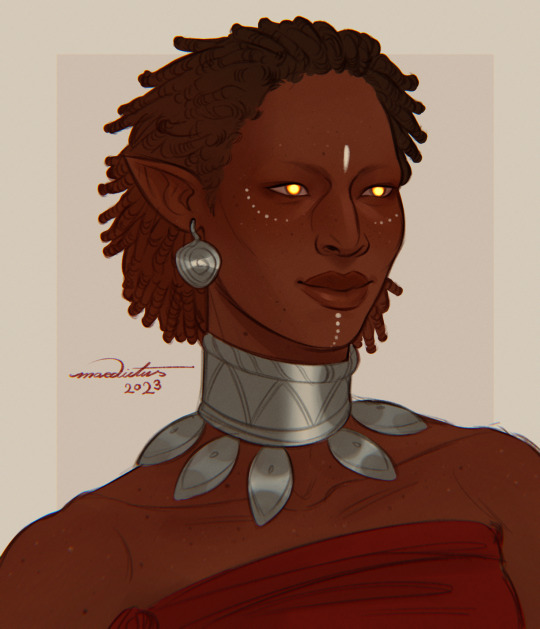
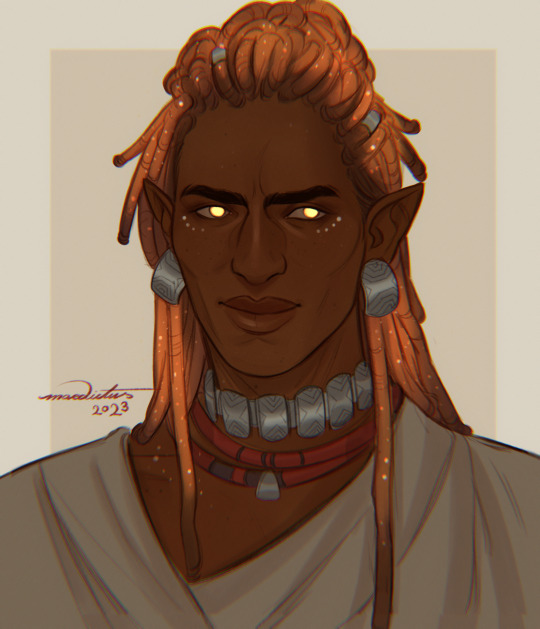
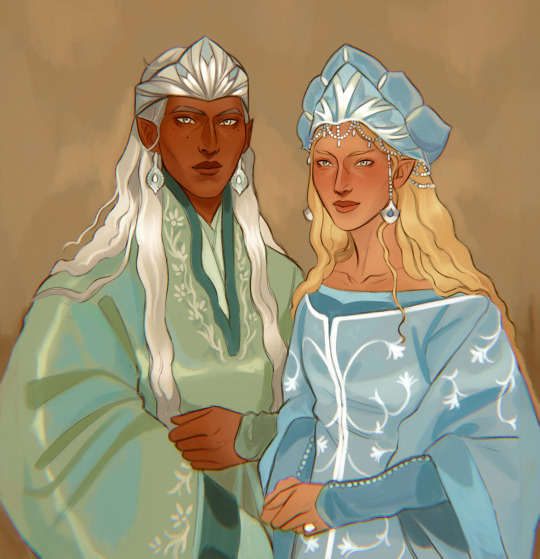
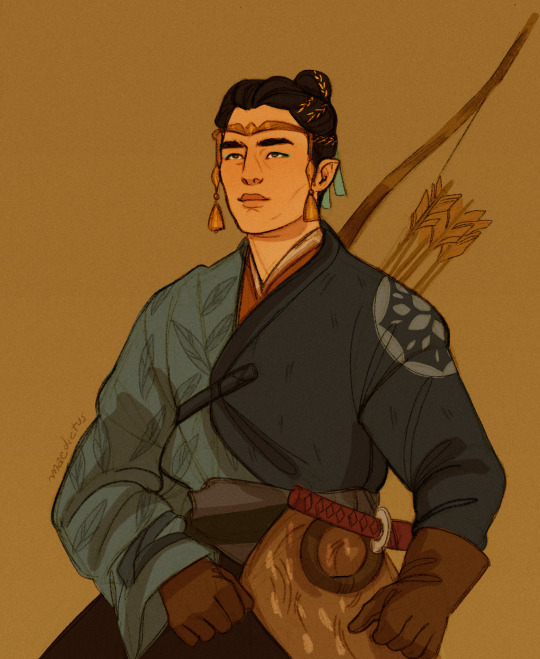

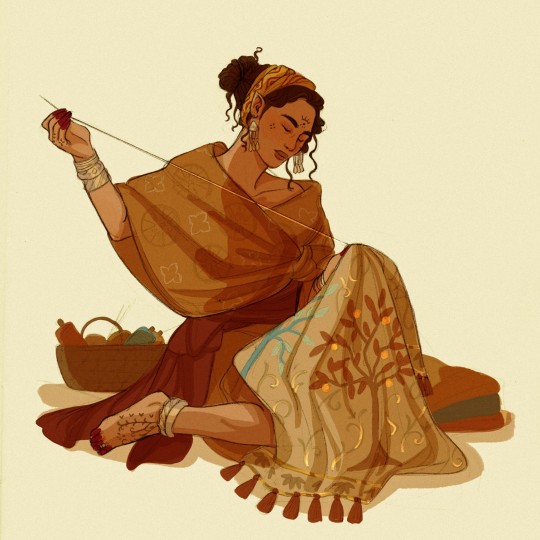
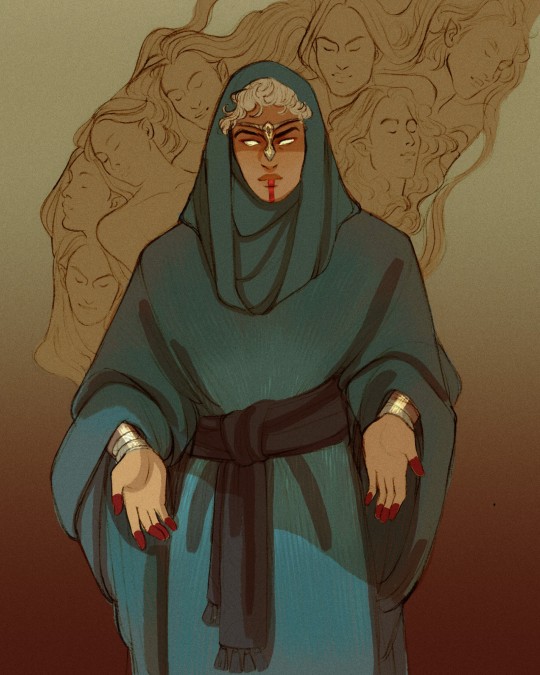


Some unposted Tolkien art I've been collecting over the years 💫
Huan and Lúthien | Yavanna and Aulë | Celeborn and Galadriel | Fingon | Galadriel but Art Nouveau | Vairë, the Weaver | Lórien and Mandos | Some Hobbiteses
#I don't think I want to tag all of these characters#So let's leave it be#Can you see how my art style just changes so much#I've been trying to go back to my traditional art style though#It's been way more fun for me#tolkien#silmarillion#lord of the rings#lotr#illustration#artists on tumblr#my art#artwork#art
4K notes
·
View notes
Text
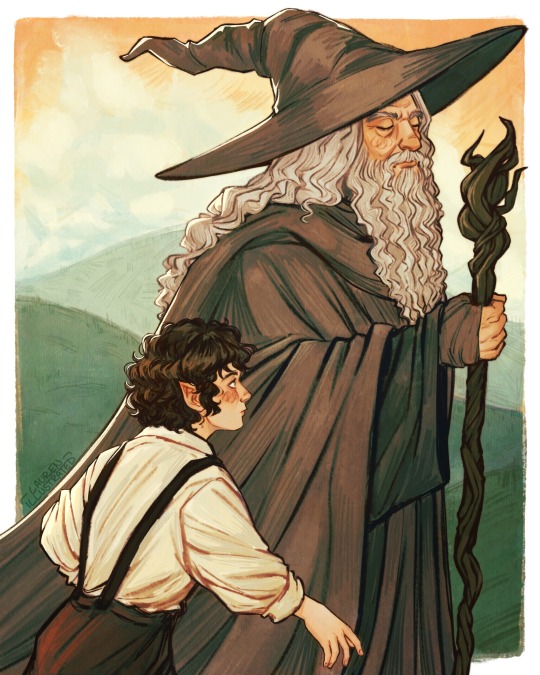
Frodo and Gandalf 🧙♂️
#frodo baggins#gandalf the grey#gandalf#frodo#lord of the rings#lord of the rings fanart#lotr#lotr fanart#lotr frodo#lotr gandalf#character art#drawing#digital drawing#illustration#digital art#illustrator#digital painting#digital illustration#digital paintings#character illustration#drawing illustration#fantasy drawing#fantasy art#fantasy illustration
8K notes
·
View notes
Text


finally, I can draw something just for fun again :')
I really like those Rohan chaps 🐎
guess it's kind of a redraw of this old thing
#my art#illustration#ink#traditional art#character design#tolkien#english literature#grima wormtongue#eowyn#theoden#rohan#lotr
6K notes
·
View notes
Text
I love how entirely guilty Boromir feels after trying to get the ring from Frodo. The way he calls out to him after realizing what he’s done, the way he falls to the ground and cries. He was more than this moment, and he bravely defended his little friends, making them seem important to the cause and keeping them alive. I love him. He’s imperfect, but noble. He was more than that moment. He was all the moments before, and the moments after.
#lotr#rereading the series and feeling overly emotional about book characters#lord of the rings#the fellowship of the ring#Boromir#frodo baggins
2K notes
·
View notes
Text
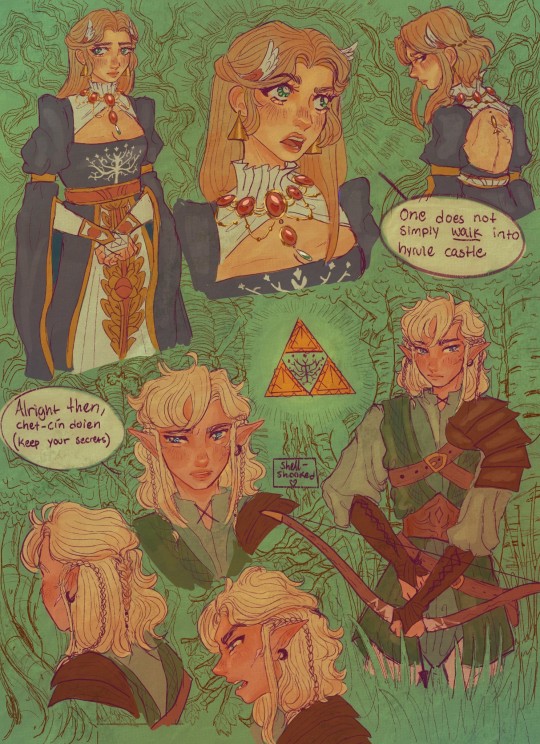
so about that lotr x zelda au...
#basic explanation zelda is lady of gondor daughter of the steward and link is a mirkwood elf#proper character profiles are in my ig and twt if you wish to know more!!#my art#tloz#the legend of zelda#zelink#loz#zelda#link#tloz fanart#breath of the wild#botw#totk#tears of the kingdom#the lord of the rings#fellowship of the ring#lotr#lotr fanart#lord of the rings fanart#zelda fanart#link fanart#zelink fanart#botw zelda#botw link#totk zelda#totk link
5K notes
·
View notes
Text
If you are a person who doesn't like Frodo Baggins I am taking you by the shoulders. I am shaking you gently. I am asking you if you've ever had to try to do something overwhelming. I am asking you if you've ever had to carry on in the face of insurmountable despair. I am asking if you've ever carried burdens no one else could know of. I am asking if you've never seen yourself in the monstrous. I'm asking you if you've ever been unable to trust your own mind. I am asking if your mental health has ever made you unreasonable. I'm asking if you've ever been too weak to take care of yourself, too weak to do the right thing in the end, too weak to do what, in your heart of hearts, you want to do. I'm asking if you've ever been too small to make a significant difference and if you tried anyway. I'm asking if you've ever faltered under something heavy placed on your shoulders. I'm asking if you've ever taken the next step despite never wanting to move again.
If you haven't yet, you will.
#haha yeah I'm fine and normal about Lord of the Rings (fights anyone with a bad Frodo take)#we are not worthy of him...#no character in fiction has ever been more important to me#a 50yo Hobbit saddled with a cursed object slowly destroying his mind is something that can actually be so personal#Lord of the rings#lotr frodo#frodo baggins#lotr
2K notes
·
View notes
Text
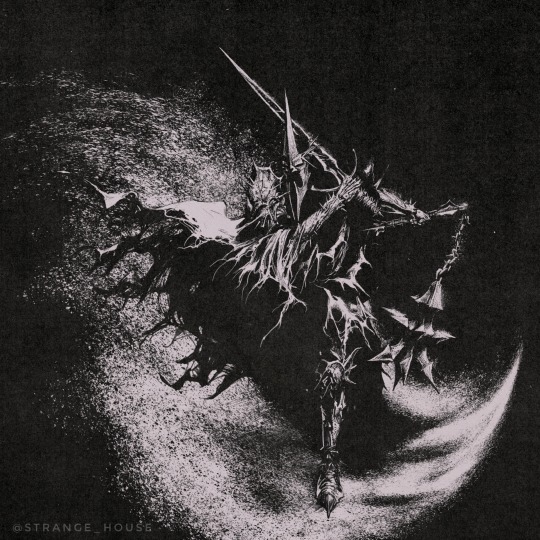
𝖂𝖎𝖙𝖈𝖍 𝕶𝖎𝖓𝖌 𝖔𝖋 𝕬𝖓𝖌𝖒𝖆𝖗
#dark art#gothic art#fantasy art#dark illustration#horror#dark fantasy art#gothic#character design#horror art#black metal art#art#drawing#digital art#lotr#lord of the rings#lotr fanart#witch king#witch king of angmar
2K notes
·
View notes
Text
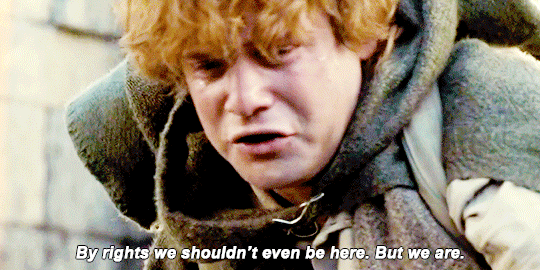
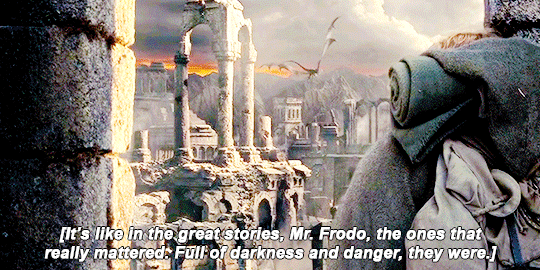
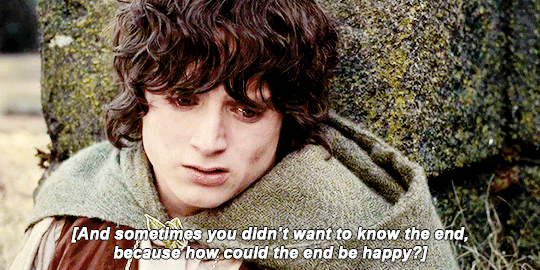

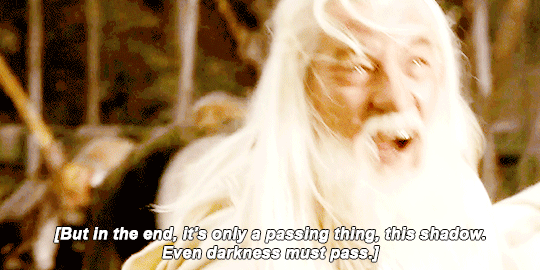



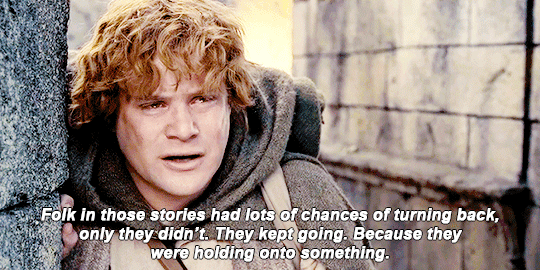
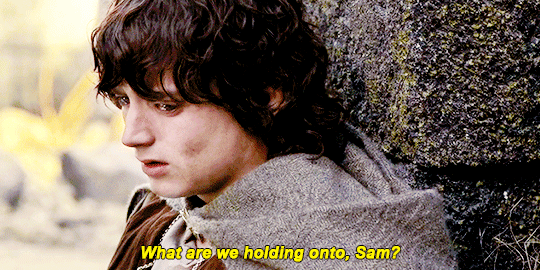


It's only a passing thing, this shadow.
#lotredit#lordoftheringsedit#tolkienedit#samwisegamgeeedit#frodobagginsedit#lord of the rings#lotr#tolkien#samwise gamgee#frodo baggins#movie: lotr#mine: lotr#character: samwise gamgee#dynamic: frodo sam#daensarah
5K notes
·
View notes
Text
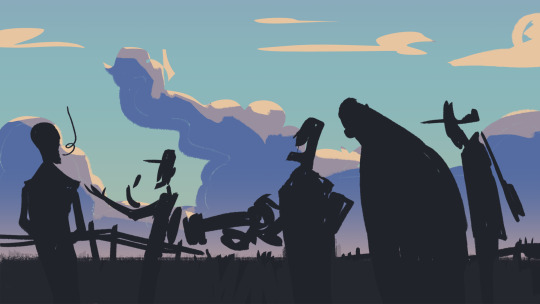
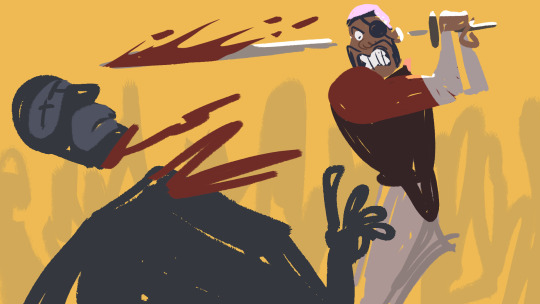
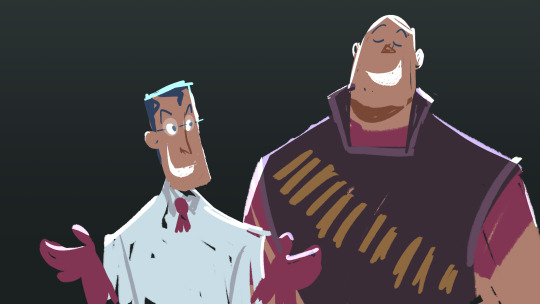
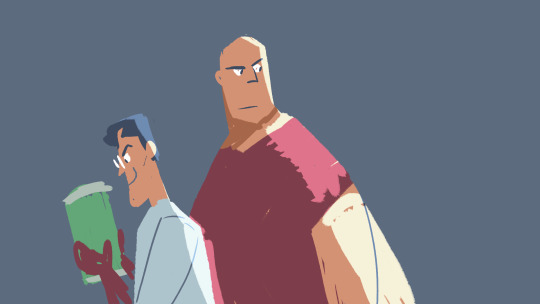
i've been posting tf2 art for a whole year! waugh, how did that happen!? really enjoyed playin and drawing this silly game for a year :)) some wee sketches that took 3-5 mins each
#tf2#tf2 fanart#team fortress 2#im not tagging all the characters as i cant be arsed#sometimes i listen to soundtracks and challenge myself to do a colour sketch for each song#so these are drawn to the shrek musical soundtrack and took 3-5 mins each#my last post with heavy n medic under the tree was from this batch too#woah look at the gradient banding on that third image#the first one is a lotr redraw btw
2K notes
·
View notes
Text
So here's one of the coolest things that has happened to me as a Tolkien nut and an amateur medievalist. It's also impacted my view of the way Tolkien writes women.
Here's Carl Stephenson in MEDIEVAL FEUDALISM, explaining the roots of the ceremony of knighthood:
"In the second century after Christ the Roman historian Tacitus wrote an essay which he called Germania, and which has remained justly famous. He declares that the Germans, though divided into numerous tribes, constitute a single people characterised by common traits and a common mode of life. The typical German is a warrior. [...] Except when armed, they perform no business, either private or public. But it is not their custom that any one should assume arms without the formal approval of the tribe. Before the assembly the youth receives a shield and spear from his father, some other relative, or one of the chief men, and this gift corresponds to the toga virilis among the Romans--making him a citizen rather than a member of a household" (pp 2-3).
Got it?
Remember how Tolkien was a medievalist who based his Rohirrim on Anglo-Saxon England, which came from those Germanic tribes Tacitus was talking about?
Stephenson argues that the customs described by Tacitus continued into the early middle ages eventually giving rise to the medieval feudal system. One of these customs was the gift of arms, which transformed into the ceremony of knighthood:
"Tacitus, it will be remembered, describes the ancient German custom by which a youth was presented with a shield and a spear to mark his attainment of man's estate. What seems to the be same ceremony reappears under the Carolingians. In 791, we are told, Charlemagne caused Prince Louis to be girded with a sword in celebration of his adolescence; and forty-seven years later Louis in turn decorated his fifteen-year-old son Charles "with the arms of manhood, i.e., a sword." Here, obviously, we may see the origin of the later adoubement, which long remained a formal investiture with arms, or with some one of them as a symbol. Thus the Bayeux Tapestry represents the knighting of Earl Harold by William of Normandy under the legend: Hic Willelmus dedit Haroldo arma (Here William gave arms to Harold). [...] Scores of other examples are to be found in the French chronicles and chansons de geste, which, despite much variation of detail, agree on the essentials. And whatever the derivation of the words, the English expression "dubbing to knighthood" must have been closely related to the French adoubement" (pp 47-48.)
In its simplest form, according to Stephenson, the ceremony of knighthood included "at most the presentation of a sword, a few words of admonition, and the accolade."
OK. So what does this have to do with Tolkien and his women? AHAHAHAHA I AM SO GLAD YOU ASKED. First of all, let's agree that Tolkien, a medievalist, undoubtedly was aware of all the above. Second, turn with me in your copy of The Lord of the Rings to chapter 6 of The Two Towers, "The King of the Golden Hall", when Theoden and his councillors agree that Eowyn should lead the people while the men are away at war. (This, of course, was something that medieval noblewomen regularly did: one small example is an 1178 letter from a Hospitaller knight serving in the Latin kingdom of Jerusalem which records that before marching out to the battle of Montgisard, "We put the defence of the Tower of David and the whole city in the hands of our women".) But in The Lord of the Rings, there's a little ceremony.
"'Let her be as lord to the Eorlingas, while we are gone.'
'It shall be so,' said Theoden. 'Let the heralds announce to the folk that the Lady Eowyn will lead them!'
Then the king sat upon a seat before his doors and Eowyn knelt before him and received from him a sword and a fair corselet."
I YELLED when I realised what I was reading right there. You see, the king doesn't just have the heralds announce that Eowyn is in charge. He gives her weapons.
Theoden makes Eowyn a knight of the Riddermark.
Not only that, but I think this is a huge deal for several reasons. That is, Tolkien knew what he was doing here.
From my reading in medieval history, I'm aware of women choosing to fight and bear arms, as well as becoming military leaders while the men are away at some war or as prisoners. What I haven't seen is women actually receiving knighthood. Anyone could fight as a knight if they could afford the (very pricy) horse and armour, and anyone could lead a nation as long as they were accepted by the leaders. But you just don't see women getting knighted like this.
Tolkien therefore chose to write a medieval-coded society, Rohan, where women arguably had greater equality with men than they did in actual medieval societies.
I think that should tell us something about who Tolkien was as a person and how he viewed women - perhaps he didn't write them with equal parity to men (there are undeniably more prominent male characters in The Lord of the Rings and The Hobbit, at least, than female) but compared to the medieval societies that were his life's work, and arguably even compared to the society he lived in, he was remarkably egalitarian.
I think it should also tell us something about the craft of writing fantasy.
No, you don't have to include gut wrenching misogyny and violence against women in order to write "realistic" medieval-inspired fantasy.
Tolkien's fantasy worlds are DEEPLY informed by medieval history to an extent most laypeople will never fully appreciate. The attitudes, the language, the ABSOLUTELY FLAWLESS use of medieval military tactics...heck, even just the way that people travel long distances on foot...all of it is brilliantly medieval.
The fact that Theoden bestows arms on Eowyn is just one tiny detail that is deeply rooted in medieval history. Even though he's giving those arms to a woman in a fantasy land full of elves and hobbits and wizards, it's still a wonderfully historically accurate detail.
Of course, I've ranted before about how misogyny and sexism wasn't actually as bad in medieval times as a lot of people today think. But from the way SOME fantasy authors talk, you'd think that historical accuracy will disappear in a puff of smoke if every woman in the dragon-infested fantasy land isn't being traumatised on the regular.
Tolkien did better. Be like Tolkien.
#tolkien#middle earth#jrr tolkien#lord of the rings#lotr#the lord of the rings#eowyn#writing fantasy#fantasy#female characters#writing#historical fiction#medieval women#medieval history#medieval#history#womens history
8K notes
·
View notes
Text
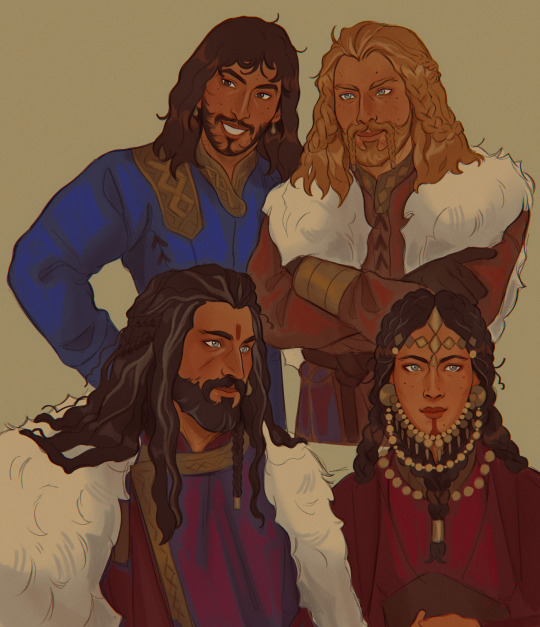
More House of Durin doddles!
#Just an excuse to draw Thorin again#Chuvash women wear beautiful pieces of jewelry around their faces#And I couldn't help but think it would be a cool concept to apply to Dwarrowdams#Can't say I nailed it this time tho#Also just realized I neglected Frerin#Too many tolkien characters I can't take it#the hobbit#tolkien#lotr#kili#fili#thorin oakenshield#dís#my art#art#artists on tumblr#artwork#illustration
3K notes
·
View notes
Text
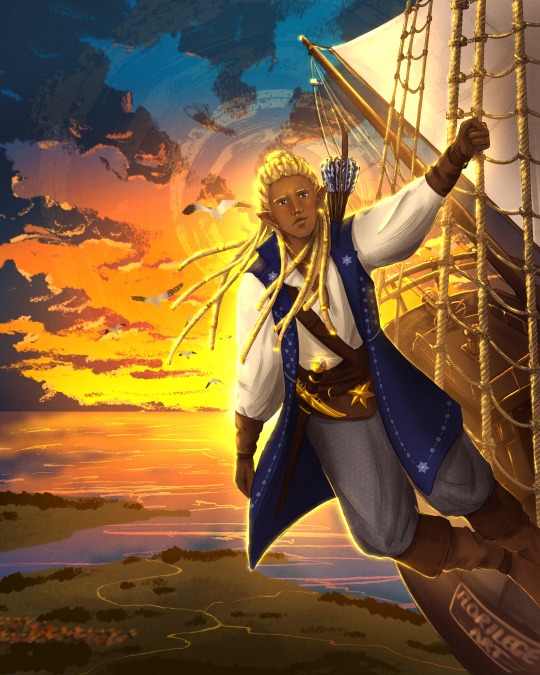
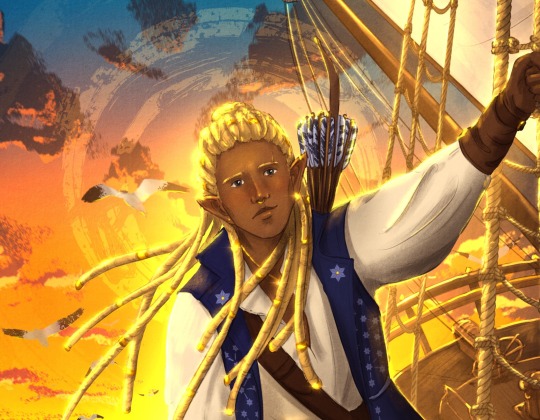
Eärendil the Mariner
Who deserves a pirate outfit more than Eärendil?
The background is largely inspired by one of Philip Sue's paintings. It was fun to draw a flat earth!
In other news, I love drawing ships but that was the worst angle possible to figure out. In my head, the Silmaril is at the prow in some kind of glass/mirror lantern that amplifies its light.
I wanted him to look soft, and little wry maybe, rather than fierce. I'm sure he's fierce aplenty but I mostly headcanon him as tired. His fate breaks my heart. Also, it doesn't really show here but my Eärendil is blind from overexposure to the Silmaril (and half-human fragile eyes).
I always waver between giving him locs or a shorter Mannish haircut, but his hair is really too kinky for the shoulder-length, Aragorn-style cut, so locs it is!
IDs in alt text.
#silmarillion#tolkien#fanart#earendil#the silmarillion#silm#lotr#echo's drawings#disabled tolkien characters#not sure if he should be part of the tag since he doesn't have a visible disability here#but on the other hand he's still disabled to me#vingilot#vingilote#ardamire#earendil the mariner#silm art#tolkien fanart
2K notes
·
View notes